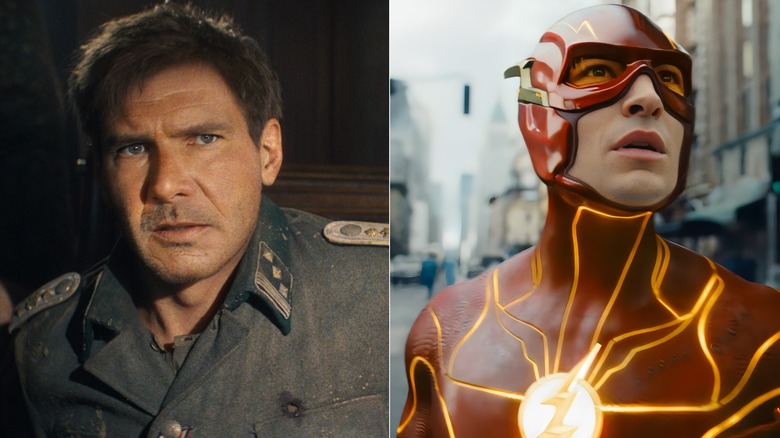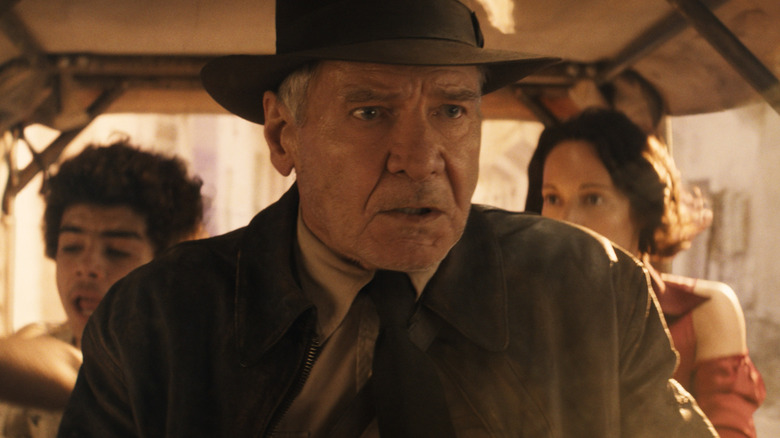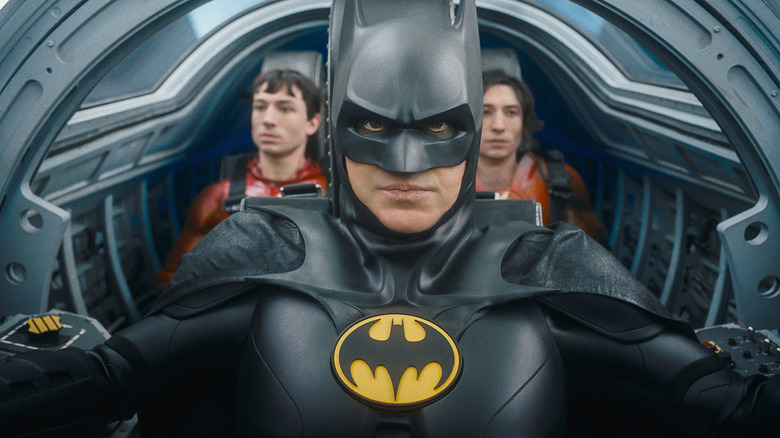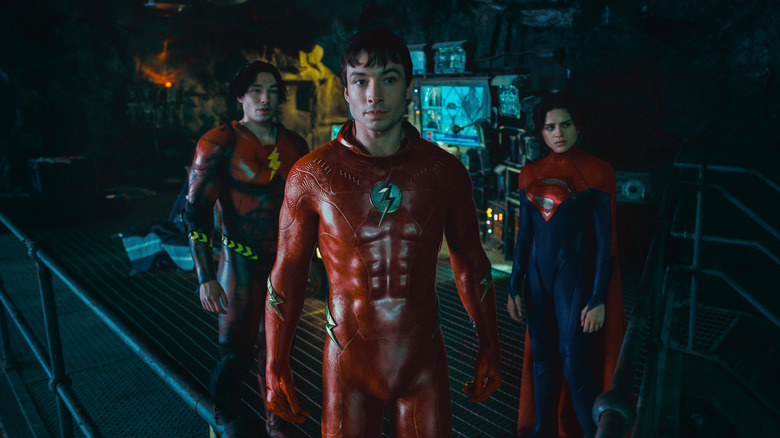Indiana Jones 5 Vs. The Flash: Which Movie Is The Bigger Box Office Bomb?
2023 has been a fascinating year at the box office for all the wrong reasons.
While the biggest story of the year is the financial (and cultural) phenomenon that was "Barbenheimer," Hollywood has a lot of lessons to learn from this summer's biggest misfires. This summer's slate was mostly riddled with IP fare, with some of the biggest films being reboots and sequels from properties that were expected to be sure-fire hits.
Unfortunately, not even the most iconic franchises of all time could produce box office juggernauts this year. When it comes to the summer's biggest bombs, audiences have a number of options to choose from, but perhaps the most pronounced are "Indiana Jones and the Dial of Destiny" and "The Flash" — two long-gestating films that failed to make an impression with audience members.
With "Indiana Jones and the Dial of Destiny," Disney is on track to lose nearly $100 million, according to Variety. For a franchise that was once considered to be Lucasfilm's crown jewel, the fifth "Indiana Jones" outing has all but confirmed that the famed archaeologist is a relic of the past, unable to bring viewers to cinemas. Then, there's "The Flash," which has been percolating in the bowels of Warner Bros.' creative factory for over a decade. Released in mid-June, just two weeks before "Indy," the film cratered, only bringing home $55 million during its stateside debut. As it stands, "The Flash" has barely turned a profit for DC — a brand that's seemingly lost its audience.
Thanks to questionable marketing, middling reception, and bloated budgets, both "Dial of Destiny" and "The Flash" are on track to be scornful reminders for their respective studios about what not to do. The question is, of the two films, which project is the bigger box office bomb?
Indiana Jones 5 is a bitter loss for Disney
Following the release of 2008's "Indiana Jones and the Kingdom of the Crystal Skull," it seemed like Lucasfilm was done with the titular character. After all, Indiana Jones (Harrison Ford) received one bombastic final adventure, got together with the love of his life Marion (Karen Allen), and discovered the existence of his son Mutt (Shia LaBeouf), a character he could hand the whip and fedora over to. And while the Steven Spielberg-directed project proved to be a box office success — it grossed over $780 million worldwide, it was treated with indifference by both audience and critics.
But "Indiana Jones" wasn't ready for retirement, as Disney's purchase of Lucasfilm compelled the House of Mouse to revisit the once-iconic adventurer. This time around, Spielberg decided to pass the torch over to "Logan" director James Mangold, making "Dial of Destiny" the first film in the franchise to not be directed by Spielberg. With a budget of $300 million before marketing costs, "Dial of Destiny" debuted to a muted $60 million stateside. In its second weekend, the Disney flick cratered, bringing in just $27 million. With a domestic total shy of $175 million, the second "Indiana Jones" legacy sequel croaked its global run with a $371 million cume.
Both audiences and critics rejected "Dial of Destiny." With a marketing budget of $100 million, "Dial of Destiny" wasn't able to motivate audiences to head to cinemas. Is it possible that fans of the franchise were done with "Indy" after "Kingdom of the Crystal Skull"? Or were audiences simply not interested in seeing an 80-year-old Ford in an action role? Or, perhaps, the George Lucas-created character is no longer relevant to contemporary audiences? Whatever the reason, the financial disappointment of "Dial of Destiny" suggests that "Indiana Jones" is done for good.
The Flash confirms DC is lost
"The Flash" is the perfect example of a film taking too long to cook in the oven. Warner Bros. initially announced the speedster's solo flick in 2014. Unfortunately, the film was plagued by pre-production issues, with DC having to deal with a revolving door of writers and directors. Eventually, Andy Muschietti was brought on board to helm the multiverse spectacle. With Ezra Miller in the titular role, "The Flash" was on track to be one of DC's most fascinating outings to date.
Not only did the film feature a multiverse storyline, which seems to be all the rage these days, but it also boasted the return of Michael Keaton's Batman — a move that, on paper, would make the film a nostalgia play, not unlike "Top Gun: Maverick." With a budget of $200 million, not accounting for marketing costs, per The Hollywood Reporter, "The Flash" wrapped up its domestic run with a $108 million haul. Globally, the speedster's first solo outing only managed to chase down a haul of $268 million. When one accounts for the film's marketing budget, "The Flash" is just the latest misfire from DC.
In theory, "The Flash" could have been a billion-dollar play, not unlike "Spider-Man: No Way Home." After all, it featured the return of Keaton as the Caped Crusader, the introduction of Sasha Calle's Supergirl, and cameos from DC iconic like Wonder Woman (Gal Gadot) and Batman (Ben Affleck). Warner Bros. even made it seem like "The Flash" was a once-in-a-generation superhero spectacle, convincing the world that it was one of the best superhero films ever made. But hype can't move mountains, as audiences rejected the film, leaving the multiverse epic to hang dry with a CinemaScore of B — a disastrous score.
Can DC move past the failure of The Flash?
When it comes to discussing if "Indiana Jones and the Dial of Destiny" or "The Flash" was a bigger bomb, one has to move past finances and focus on each franchise's respective viability going forward. While it's unknown how much both films lost for their respective studios, both "Dial of Destiny" and "The Flash" stand out as some of the biggest box office bombs of all time.
It's unclear why Disney thought "Dial of Destiny" would be a practical way to spend $300 million, especially when one considers that the franchise essentially lives and dies on Harrison Ford's shoulders. 81 years old as of this writing, Ford's action hero days are, bluntly speaking, over, with the financial receipts of "Dial of Destiny" confirming that. Whoever wanted to show up for another "Indiana Jones" film did, but the $374 million haul wasn't enough to turn a profit. If the film had a $100 million budget with a smaller scope, "Dial of Destiny" could have turned a considerable profit and functioned as a beautiful, intimate swansong to Ford's tenure as the archeologist. Unfortunately, Disney treated Indy like a "Star Wars" or Marvel blockbuster, giving the franchise a budget it simply didn't deserve.
"The Flash," however, is forcing DC to face an existential question about its viability. The Warner Bros.-owned superhero franchise is now on track to be rebooted by James Gunn, but can it succeed, especially after the disaster that was "The Flash"? Despite having the most brand appeal (it boasts two Batmen, one Supergirl, and a decent rendition of The Flash), nobody showed up to watch the film. It made even less than 2022's "Black Adam."
While both "Flash" and "Indy" were disasters, at least "Dial of Destiny" didn't make anyone question the franchise's future.



